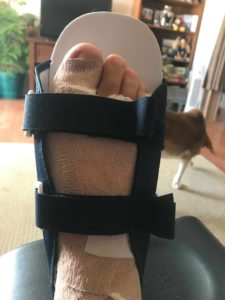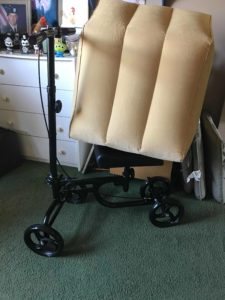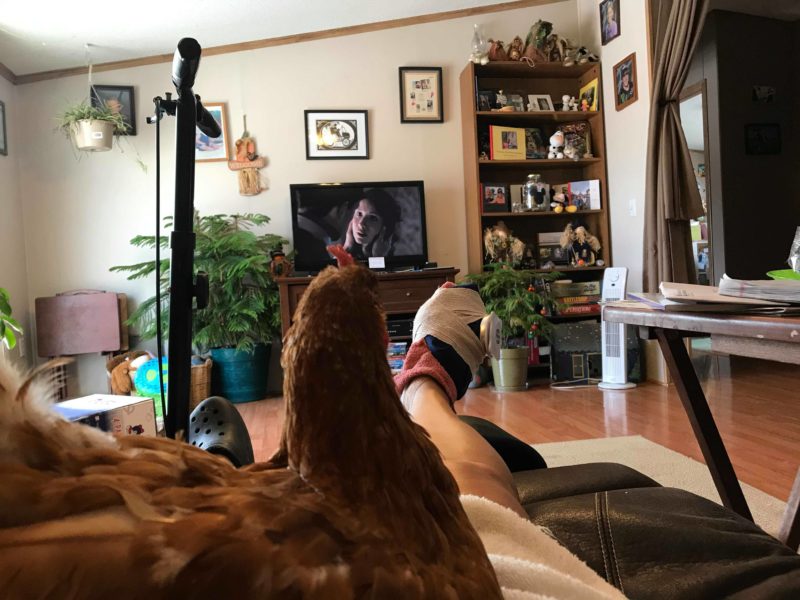Blogger Traci DeLore found herself in a cast and had to figure out how to care for her flock while temporarily disabled.
Have you ever thought about caring for your flock when you’re injured or not able to do so? What would you do if illness or injury made it so you weren’t able to care for your flock for weeks?

Surgery on my foot meant no walking – and no taking care of my flock – for weeks! I had to make plans for others to help out.
That’s the situation I’m in as I write this. Due to foot surgery, I have not been able to put any weight on my right foot for a month. Sadly, I have at least two more weeks to go before the doctor will even consider letting my foot hit the floor.
However, my current flock of 61 chickens and three ducks still needs tending. Fortunately, I have my college-student daughter and husband here to help me out. Most mornings my daughter heads out to let everyone out and feed them. She usually refreshes water and gathers the eggs in the afternoon after class. Some nights she’s home to lock them up. When she’s at work, my husband closes up the coop when he gets home from his job.
While all this is going on, I’ve been stuck on the couch, foot elevated, bored stiff, and missing my feathery pals.
I really don’t know what I’d do if I didn’t have people here to help with the flock. For the future, I really need to develop a solid plan for caring for my flock when I’m injured.
Adaptive equipment to help with caring for your flock while injured

I bought a knee scooter and a leg ramp for after my surgery and *thought* I was all prepared. Little did I know how much I would miss my flock.
I purchased a knee scooter in advance of my surgery on the advice of a friend. She said it would be much better than crutches, and she was right! However, as great as my knee scooter is for getting around the house and the doctor’s office, it is NOT an off road vehicle. It doesn’t help with steps and it doesn’t really roll across the grass.
In addition, this time of year we often have snow, which assures I won’t be rolling around outside on the scooter.
There are other options available, depending on your budget and your abilities, that might make it possible for you to care for your flock while injured. There are crutches. I could’ve rented a wheelchair. There is even a “peg leg” crutch you can buy so you can walk! However, with the steps in and out of our house, the uneven ground in the chicken run, and a step up into the coop, I worried about all these options. My daughter was willing to help and the easier choice for physical reasons.
Emotional effects
Emotionally, this experience has been much, much harder than I expected. First, I’m a bit of a control freak when it comes to the flock (when it comes to everything if you ask my family). It’s been hard to let go of that control. My husband has done all the winterizing of the run this year. My daughter is the one monitoring flock health. Both are more than capable and have been doing an amazing job. However, it’s definitely not easy to let go and not be the one caring for my flock while I’m injured.
Second, I’ve always joked that my chickens are my therapy. With my current situation, I’ve realized just how true that is. I miss just being outside with the flock. I miss Penny, although my daughter did bring her inside to visit me.

My daughter brought Penny in to visit me. We watched Outlander together. Don’t worry, she’s on top of an old towel.
About three weeks after my surgery, I managed to use crutches to get onto our back patio. I sat down to wait, and my daughter let the flock out. I almost cried when they came running while I sprinkled some treats for them. Some were skittish as if they didn’t remember me. Penny marched up and demanded my full attention as she always does.
While the chickens walked across my propped up leg – thankfully avoiding my foot! – I just sat there and drank it all in. I cuddled as many of them as I could. It was good for my soul to see them all, even if it was only for about 20 minutes. Fingers crossed, I’ll be back out there with them again before I know it.

The one time I managed to get outside before it snowed was priceless. I was so happy to see everyone. And yes, that’s Penny standing on my leg.
Traci DeLore grew up around chickens on her family’s farm, but didn’t start keeping her own chickens until she was in her 40s. Her desire to keep chickens came from a desire to have her own fresh eggs from chickens she knew were well cared for and happy. Traci started with six chickens – and then chicken math took over. These days, she has about 60 chickens — and three “rotten” ducks. (I say this because having ducks is like living with toddlers.) Traci also raises and processes her own meat chickens on occasion. Follow her on Instagram.
Community Chickens wishes her a speedy recovery.












